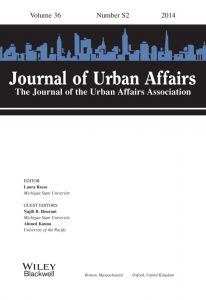The Future of American Television Part 2
 by bmckernan
by bmckernan
A few weeks ago, I wrote a post on Sociology Lens entitled “Is Jay Leno the future of television?” Using Leno’s new prime time variety show as a backdrop, the post examined some of the current issues facing the television industry in America, particularly the decline in network ratings and the increased segmentation of the American television audience. Last week, many of these themes were visible at the industry’s own annual awards show, the Emmys.
One need only to examine a list of awards recipients to gain insight into at least one of the challenges facing network television dramas. Similar to the last few years, shows on cable television received many of the awards in drama, highlighting the challenging and seemingly contradictory position network television finds itself. On the one hand, given its size network television requires larger ratings than cable television, necessitating that network dramas cater to larger audiences. A network’s season is also longer than a season on cable television, demanding more content from each show. Some suggest that these two factors inhibit the “quality” and “creativity” of network dramas, which perhaps explains their dwindling recognition at the Emmys.
Of course, as discussed in the last post, network television is also failing to succeed at maintaining the large audiences it requires, leading NBC to try its hand at cheaper to produce primetime programming such as Leno’s new variety show. However, network dramas (and comedies) employ a much larger size of the cultural industries’ workforce relative to variety shows. If NBC’s gamble proves successful, other networks may follow suit, potentially leading to a loss in employment for many cultural workers. Television actress/writer Tina Fey expressed this concern in her acceptance speech, thanking NBC for keeping her sitcom on the air “even though we are so much more expensive than a talk show.”
However, there was one additional theme readily apparent and openly expressed at the Emmys that my last post failed to mention. Due to technological advances such as cable television, the internet, DVR, and even the remote control, the viewing habits of today’s television audience differs vastly from the “golden years” of American television. Today’s television audience is much more likely to channel surf and filter through commercials by using a DVR or watching shows on the internet. Such behavior directly calls into question the viability of advertising on television, which overtime may force advertisers to look elsewhere to market their products and lead the television industry into a dire scramble to construct a new source of revenue. The industry wasted no time discussing this concern at the Emmys, opening the show with a Broadway style performance entitled “Don’t touch that remote,” and later in a separate skit poked fun at online television’s small screen size and often unreliable streaming technology.
Nearly three years ago, prominent media scholar Henry Jenkins discussed many of these concerns in Convergence Culture. Jenkins predicts that the “future” of television (and popular culture in general) lies not in the production of standalone products targeting massive audiences but multimedia cultural texts catering to smaller, more “loyal” fan-bases. Jenkins uses The Matrix as an example. The Matrix started as a popular film, but quickly turned into a multimedia juggernaut, complete with two additional films, books, graphic novels, anime, video games, and even an online role-playing game. The producers of these texts incorporated each product into an overarching story, requiring audiences to experience all the different texts in order to fully grasp the universe and the narrative, a move that caters strongly towards avid fans.
While this is one possibility, Jenkins also examines an alternative strategy: product placement. While never fully disappearing, during the last few decades brand tie-ins have been relatively small compared to the industry standard in the 1950s. However, in lieu of the struggle to keep viewers watching, many contemporary television programs are returning to this strategy. For example, viewers of American Idol are bombarded with endorsements for Coca Cola and Ford. Perhaps fittingly, Jay Leno’s new show on NBC also plans on incorporating products into the broadcast.
![]() Andy Brown “Popular Music Cultures, Media and Youth Consumption: Towards an Integration of Structure, Culture and Agency “
Andy Brown “Popular Music Cultures, Media and Youth Consumption: Towards an Integration of Structure, Culture and Agency “




1475-6781/asset/JSS.gif?v=1&s=377bb8e0c3d0fcf201f301ded7cf610142072c3e)
1468-0491/asset/society_affiliation_image.gif?v=1&s=859caf337f44d9bf73120debe8a7ad67751a0209)
It seems there are two different constituencies worried about profit and wages: the culture workers and the networks. While the shift to other modes of content delivery might be the end of networks, there may be something exciting for culture workers in what Jenkins says. This could bring about a form of democratization of cultural products, which seems exciting to me.
Keri
@kiyallsmith
Indeed, we should distinguish between the cultural workers’ concerns and the television networks.
However, while I agree that today’s “convergence culture” has the potential to more fully democratize cultural products, as sociologists we shouldn’t lose sight of the structures and conditions that will continue to limit this democratization.
The internet and high bandwidth access certainly give cultural producers the ability to directly share or sell texts to their audiences, potentially eliminating the need for large scale distributors such as television networks and retail chains.
However, when we look at which cultural producers have had success with this arrangement, many of the most successful have come from relatively established cultural careers beforehand, such as popular musicians Radiohead and Nine Inch Nails as well as the writer/director Joss Whedon.
Furthermore, while the internet may still have the appearance of a wild west frontier, an overwhelming number of users visit the same websites. We should be open to the possibility that eventually something similar to network/cable television will emerge on the internet, with a few massive internet outlets distributing many of the cultural texts consumed by the majority of society (the i-Tunes store is probably a good example of this).
This is not to dismiss the fact that cultural producers today do indeed have alternatives to the major network system. However, as Jenkins himself notes, today’s convergence culture does not eliminate cultural power inequalities between the cultural industries (and cultural workers) and their audiences, but does at least potentially make the relationship more contentious.